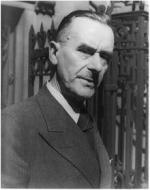Disable ads!
Thomas Mann
This article needs additional citations for verification. Please help improve this article by adding citations to reliable sources. Unsourced material may be challenged and removed. (June 2014) Thomas Mann Mann in 1937 Born Paul Thomas Mann (1875-06-06)6 June 1875 Free City of Lübeck, German Empire Died 12 August 1955(1955-08-12) (aged 80) Zürich, Switzerland Occupation Novelist, short story writer, essayist Period 1896–1954 Genre Novel, novella Notable works Buddenbrooks, The Magic Mountain, Death in Venice, Joseph and his Brothers Notable awards Nobel Prize in Literature (1929) Goethe Prize (1949) Signature Paul Thomas Mann ([paʊ l toːmas man]; 6 June 1875 – 12 August 1955) was a German novelist, short story writer, social critic, philanthropist, essayist, and the 1929 Nobel Prize in Literature laureate. His highly symbolic and ironic epic novels and novellas are noted for their insight into the psychology of the artist and the intellectual. His analysis and critique of the European and German soul used modernized German and Biblical stories, as well as the ideas of Goethe, Nietzsche and Schopenhauer. Mann was a member of the Hanseatic Mann family and portrayed his family and class in the novel Buddenbrooks. His older brother was the radical writer Heinrich Mann and three of his six children, Erika Mann, Klaus Mann and Golo Mann, also became important German writers. When Hitler came to power in 1933, Mann fled to Switzerland. When World War II broke out in 1939, he immigrated to the United States, returning to Switzerland in 1952. Thomas Mann is one of the best-known exponents of the so-called Exilliteratur.
 Read more on wikipedia.org Read more on wikipedia.org
 All quotes by Thomas Mann All quotes by Thomas Mann
 Edit Edit
|

|
|
|
|
|
Background photo by Giuliana
|